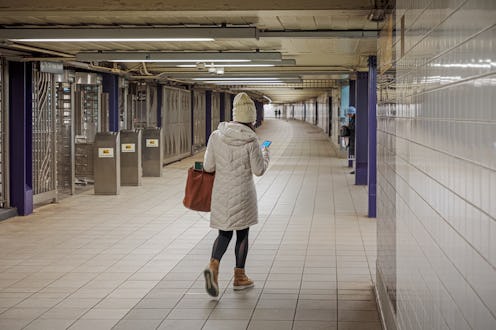Life
Worried About Catching Coronavirus On The Subway? Here's What Experts Say

Transit systems across the country, including New York's MTA, are revving up their daily cleaning routines, but that doesn't mean everyone feels safe taking public transit during the coronavirus outbreak. Before you pick up your phone and schedule a rideshare instead of hopping on the subway, though, there are a few facts you should keep in mind. While both options come with risks, experts say rideshares could be a better bet for people who are especially susceptible to coronavirus or have preexisting conditions.
Should You Stop Taking The Subway Because Of Coronavirus?
In a series of coronavirus-related tweets, New York City Mayor Bill de Blasio suggests being extra careful if you take the subway. "If the train that pulls up is too packed, move to a different car or wait to take the next one," he tweets. "Bike or walk to work if you can." He also suggests avoiding rush hour if your job allows you to, and avoiding the subway altogether if you might be sick with coronavirus, or if you have a preexisting condition that suppresses your immune system.
Taking into consideration the fact that many people exclusively rely on the subway, this advice is not universally applicable. According to Dr. John Ioannidis, M.D., professor of medicine and of epidemiology and population health at Stanford University, you shouldn't worry if the subway is your only option right now. "The risk would be extremely low with pubic transportation or rideshares," he tells Bustle. "We have no evidence that would lead us to use one in preference over the other." Instead, Ioannidis suggests the public shifts its focus to "telling people who feel sick to stay at home" instead of interrupting people's daily commute.
Alternatively, Dr. Terry Gordon, Ph.D, professor of environmental medicine at NYU School of Medicine, tells Bustle that "riding the subway trains may bring a bigger risk [than a rideshare] of encountering a coronavirus-infected person." But he admits that even so, he still plans on using public transit during the coronavirus outbreak.
Are Rideshares Safer During The Coronavirus Outbreak?
On March 6, the New York Times reported that an Uber driver in Queens, New York contracted coronavirus. Later, in an effort to get ahead of future cases, both Uber and Lyft announced that they would offer paid sick leave for two weeks to drivers who have been quarantined or infected with the virus. They hope this encourages drives to be responsible when it comes to both their health and their passengers' health.
Additionally, on March 17, Uber and Lyft announced that they will be suspending "pool" and shared ride options for the time being in the U.S. and Canada because of coronavirus. While you can still book individual rides with both companies, Uber now has in-app notifications urging people not to travel unless it's completely necessary.
As far as taxis go, the Taxi and Limousine Commission (TLC) advised its drivers to keep their windows open to help circulate air during rides, and to disinfect their vehicles at least once a day, and after each passenger, if possible. This is a more frequent deep cleaning than subways, commuter trains, buses, and the stations are getting.
Dr. Dena Grayson, M.D., Ph.D., an expert in Ebola and viral pandemics, tells Bustle that because of these cleaning policies, rideshares could be a better option for elderly people and anyone with chronic lung issues, cardiovascular disease, or diabetes. Though there's always the chance that you could catch coronavirus from a taxi or rideshare, she says they are "less risky than a crowded subway car or bus."
Taking all of the experts' opinions into consideration, walking, riding a bike, or taking a rideshare with the windows cracked seem to be the safest options for reducing your risk of contracting coronavirus. It's easier to rely on a car service being cleaned in between passengers than a subway or bus. Less people is less exposure.
Experts:
Dr. John Ioannidis, M.D., professor of medicine and of epidemiology and population health at Stanford University
Dr. Dena Grayson, M.D., Ph.D., an expert in Ebola and viral pandemics
Dr. Terry Gordon, Ph.D, professor of environmental medicine at NYU School of Medicine
If you think you’re showing symptoms of coronavirus, which include fever, shortness of breath, and cough, call your doctor before going to get tested. If you’re anxious about the virus’s spread in your community, visit the CDC for up-to-date information and resources, or seek out mental health support. You can find all Bustle’s coverage of coronavirus here.
This article was originally published on